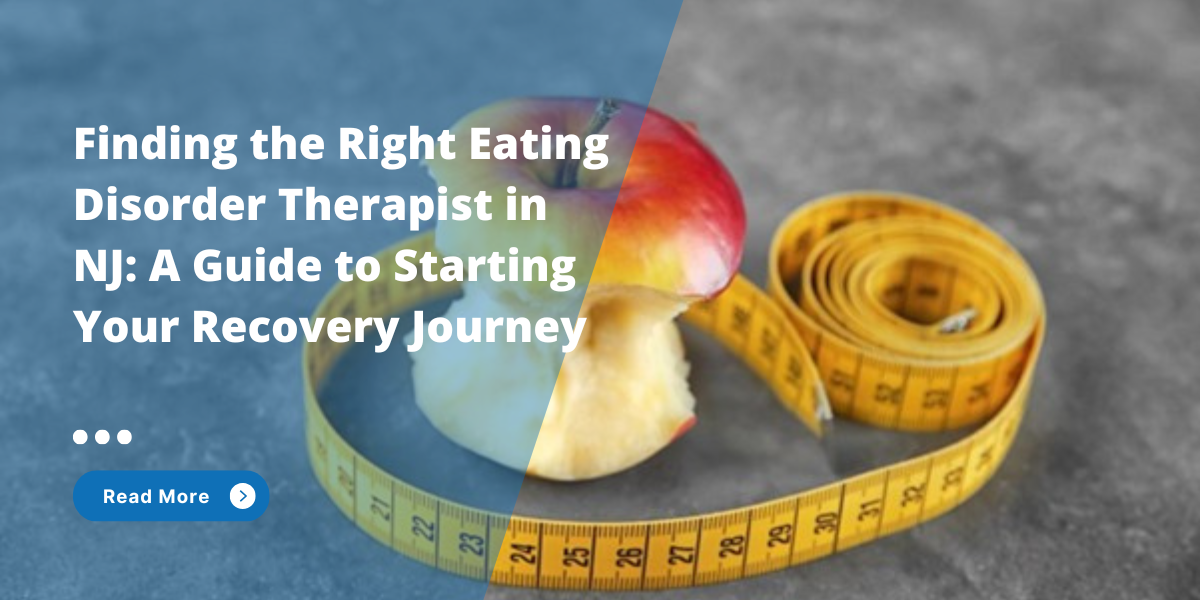How Telehealth is Revolutionizing Autism Care in New Jersey Telehealth medicine is quickly becoming one of the best options Modern...
Continue Reading
Living with an eating disorder can feel like a constant battle with food, your body, and even your own thoughts. It’s a struggle that impacts not only your physical health but also your mental health. If you’re reading this and exploring ways to get psychological help, you’ve already shown a great deal of courage. This guide is here to help you find the right therapist and take the first steps toward healing and self-discovery.
Eating disorders come in many forms, each with its own challenges and impact on mental health. While anorexia nervosa and bulimia nervosa are among the most well-known, other common disorders include:
It can affect to anyone, from children as young as five to adults over eighty. They are alarmingly prevalent, with 9% of US residents experiencing at some point in their lives. These conditions don’t discriminate based on race, yet people of color are significantly less likely to be diagnosed or receive proper treatment. However, gender disparities do exist, with females being twice as likely as males to develop an eating disorder.
The impact of this extends far beyond physical health. They are deeply intertwined with mental health issues such as anxiety, depression, and low self-esteem. This makes seeking professional therapy an essential step in the recovery process. The urgency of treatment is underscored by sobering statistics: in the United States, approximately 10,200 people die each year as a direct result of an eating disorder.
An eating disorder therapist is more than just someone who listens; they are trained professionals equipped to guide you through recovery. Therapists use evidence-based approaches such as:

Finding the right therapist can feel overwhelming, but these tips can help:
By working with a qualified therapist in the collaborative cultural environment of the Advanced Psychology Institute, you can access the support needed to heal and rebuild your relationship with food and yourself. Whether you’re located in NJ, NY, or anywhere in the world, our online therapy services make expert care accessible from the comfort of your home.
The first step in your journey at the Advanced Psychology Institute is a thorough and personalized assessment, typically conducted over one or more sessions. During this process, your therapist will take the time to understand your specific challenges and goals. Together, you’ll explore which therapeutic approach is the best fit for your needs. We recognize that many individuals with eating disorders feel conflicted about seeking treatment or making changes. That’s why we put special emphasis on building engagement with the patient.

At the Advanced Psychology Institute, we offer flexible therapy options designed to meet you where you are—both emotionally and physically. Whether you prefer the convenience of online therapy or the in-person connection of our offices in New Jersey, you’ll receive expert, compassionate care. Depending on your needs, other professionals may be assigned to work with you, including a psychiatrist, trauma counselor, and health coach.
How Telehealth is Revolutionizing Autism Care in New Jersey Telehealth medicine is quickly becoming one of the best options Modern...
Continue ReadingUnderstanding and Managing Emotions with Message-Centered Therapy Emotions are the brain’s way of analyzing our social environment, and they have...
Continue Reading5 Benefits of Online Depression Therapy While both in-person and online counseling can be very effective for relationship counseling, depression,...
Continue ReadingRequest an Appointment
(201) 497-0289


Copyright © 2024 | All Rights Reserved | Created By Invisio Solutions Ltd